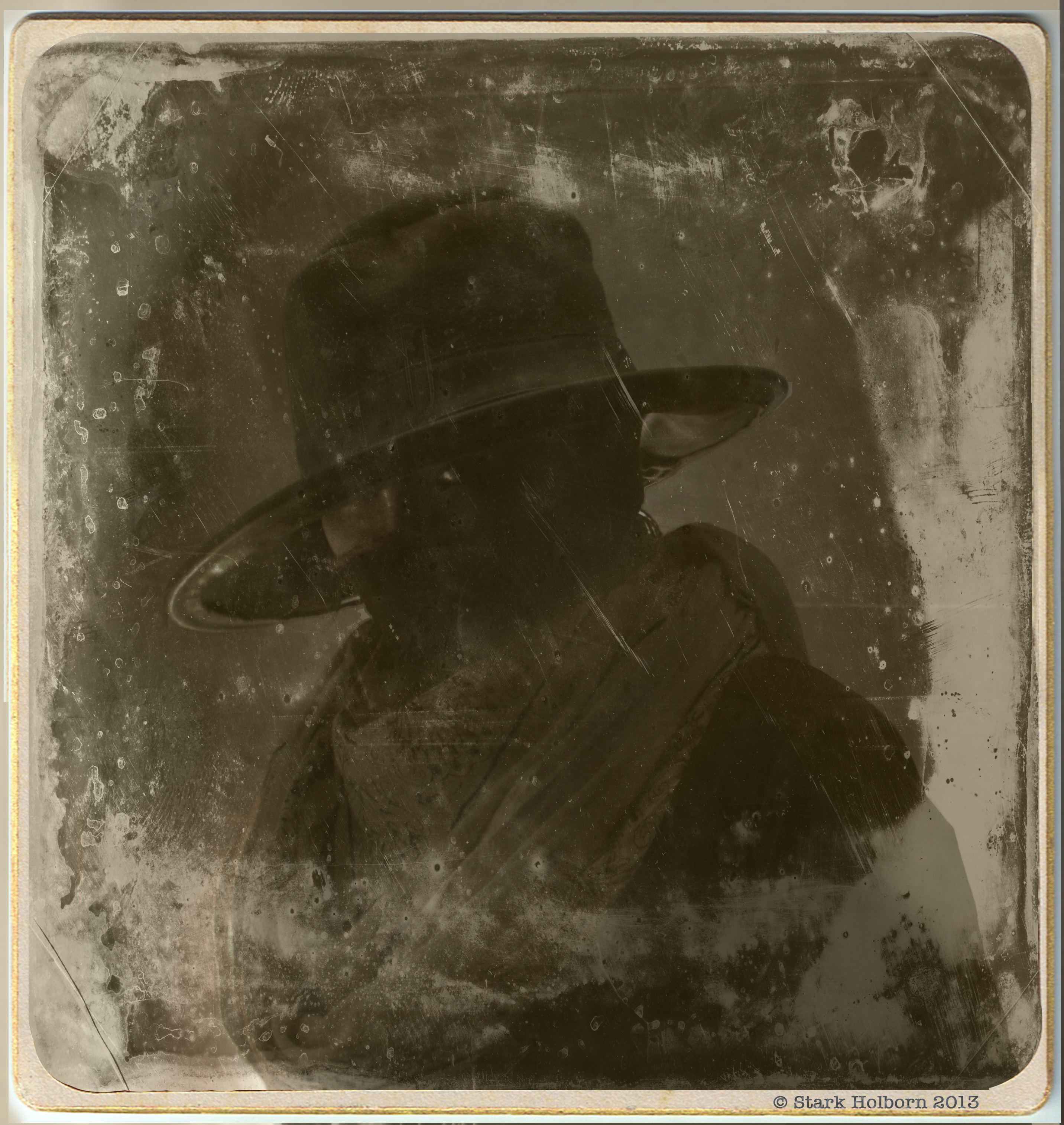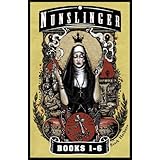
Small time liquor bootlegger, purveyor of Penny Westerns and author of Nunslinger.
Stark Holborn is an enigmatic character with a six-gallon hat and a past shrouded in mystery. Nunslinger is Stark’s first published work.
We at Bristol Book Blog caught up with Stark and Hornswoggled an interview whilst Stark was busy breaking in a fractious Equus Ferus right here in the Mild, Mild West:
For anyone that hasn’t read them can you tell
us a bit about your books?
Despite its
pulpy title, Nunslinger is a traditional Western: it was originally told
in good ol’-fashioned, penny-Western, serialized format – only with ebooks –
with installments spread across the year. The Complete Series paperback is a
collection of all twelve novellas.
They tell the
story of one Sister Thomas Josephine, a young Visitandine nun who sets out from
St Louis, Missouri towards a mission in California. When an attack on her wagon train leaves her
stranded in Wyoming, she finds her faith tested and her heart torn between Lt.
Theodore F. Carthy, a man too beautiful to be true, and the mysterious grifter
Abraham C. Muir. She ends up being falsely accused of murder and goes on the run… you get the picture! While it’s
packed full of Western-style adventure, it also has a more serious side. Sister
TJ is a complex protagonist who constantly finds herself coming up against murky
morality of the frontier and its inhabitants.

Tell us a bit more about the last book you
wrote
Well now
that’s a tough one! So happens that I write under a range of pseudonyms… can’t
be that you’re asking me to give away one of my secret identities?
<Gosh darn it, no bushwacking Stark now is there?>
What did you learn about writing whilst
writing the last book you wrote?
To be
honest, writing Nunslinger has been the best lesson in fiction writing I
could have hoped for. Due to the serialized format and the tight publication
schedule, I think I worked out that I wrote something like 180,000 words in
nine months. It taught me to write quickly, and more importantly, to make
decisions quickly: more than once when a book wasn’t working, I went ahead and
scrapped the whole thing and started again, even with limited time. It taught
me to follow my instincts when it comes to characters and action, rather than
trying to over-plot things. On a practical level, it’s been like writing,
editing and proofing a novel twelve times, in miniature. Of course, it was made
easier by the fact that I had an absolutely amazing editor (and editorial team)
supporting me.

Do you have a set writing process, if so
what is it?
I’ve been
lucky enough recently to make writing a (mostly) full-time gig. Practically, it
really depends on what I’m writing, but generally I work best in the mornings,
before 2pm. If I’m on a deadline I tend to get up, brew a jug of coffee and get
to work (that often means not getting dressed until after lunch: the postman
has learned this now). In the afternoons I tend to review and edit and do “life
admin”. If I’m on a really tight deadline, I’ll start writing again before
/ after dinner, if needs be. I don’t usually write after midnight. In reality,
there’s probably only about 4 hours of intense writing time in all of that: the
rest is staring, writing involves a lot of staring into space and making drinks of various kinds. If I’m not quite so
hectic, then I won’t work as much in the evenings, but mornings are always
writing time.
Do you write a lot of short stories?
Increasingly!
I hadn’t written many before, but now I’m in the habit. (Sorry – pun). I tend
to write in scenes anyway, or chapters of not more than 2-6 pages. Short
stories are a great medium for honing technique, especially in terms of developing
characters over a short period of time.
Do you prefer the long or short form? How
do you feel about Flash Fiction?
Short form
merging into long form? Is that a cop out of that question? I get very jealous
sometimes of poets and songwriters, at how they’re able to condense so much
into a limited space. There’s a singer-songwriter called Anais Mitchell who
writes the most wonderfully evocative, economical lyrics. (I listened to one of
her albums on repeat when I was writing a few of the Nunslinger books). I
haven’t tried flash fiction myself, but I guess the same rules apply?

Which character in your books do you most
identify with and why?
Sister TJ
is the obvious choice, although a strange one: I’m an atheist and she’s… well,
a nun. But in many ways her faith is based in her strong sense of empathy, her
desire to try and make the world better in small ways – to see and treat people as human – and that’s
something I feel strongly about too.
Which bit of your writing are you most
proud of?
Hmmm… It’s
a funny thing, liking your own work. If I like something, then I always have
the fear that it’s not very good. Usually, I’ll be cautiously optimistic, but
very aware of the thing’s flaws. It so happens that two of the Nunslinger
books, both which I detested at the time and saw me wallowing on the floor in
despair, were my editor’s favourites. I didn’t see it then, but now, with a bit
of distance, I agree with her. The things I thought made them awkward, or dull,
were actually their best features. Overall, I think being satisfied with your
own work is a dangerous thing: sometimes it’s the things you can’t see or don’t
appreciate as an author that most interest other people.
Tell us a bit about how you got published?
Did you go via a slush pile? Get an agent before a publisher?
Yes, the
manuscript for my first novel was yanked out of the slush pile by my agent, Ed
Wilson. I was pretty young and naïve, and had basically sent the thing out on a
whim, because I thought: well, what’ve I got to lose? The novel wasn’t even
finished! Anyway, he worked with me on that until it was, then we submitted it
to publishers. There was some interest but it was just too weird for
anyone to pick up. In hindsight, I’m actually really grateful for that. It
meant that I had to put it aside, and start writing something else. My agent
likes to remind me sometimes that he still has that original submission in
his office, which makes me squirm…
In one sentence what is your best piece of
advice for new writers?
Go and
write; it’s like playing the piano, the more you do it, the better you’ll be.
Many thanks to Stark for answering our questions!
Bristol Book Blog is giving away two copies of Stark's book, the complete Nunslinger! Here: http://brsbkblog.blogspot.co.uk/2014/11/book-giveaway-nunslinger.html
No comments:
Post a Comment